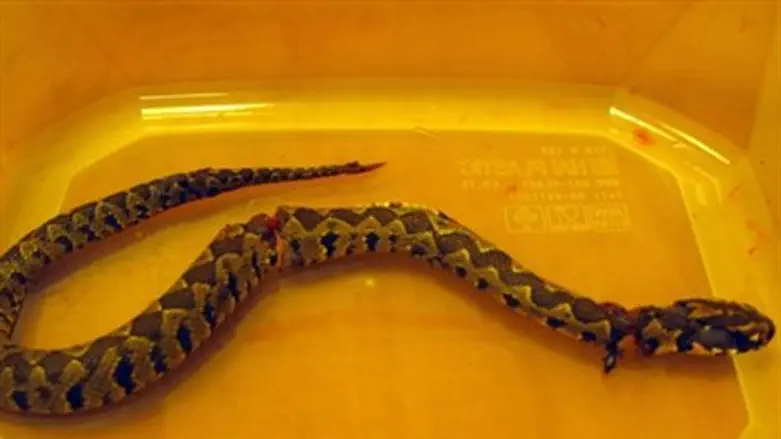
For Meori Ratzon, a 10-year-old boy from Kibbutz Givat Haim Meuhad located near Hadera on the coast, Thursday was no ordinary day of school. Waiting for him in his classroom was a viper snake.
Ratzon arrived at the children's emergency room of Hillel Yaffe Medical Center in Hadera on Thursday morning after the viper bit him. The bite occurred as Ratzon and other students were preparing a surprise party for their teacher.
Apparently the viper had taken shelter in the school due to the heavy rains that began Wednesday night, and had hidden itself under a cupboard in the classroom. Ratzon was bitten by the viper as he was near the cupboard.
School staff immediately called an ambulance to evacuate Ratzon to the hospital, and informed his parents of the incident. Additionally, the staff trapped the snake to bring it to the emergency room, so that the type of venom could be identified.
Dr. Or Krieger, who treated Ratzon at the children's emergency room, noted that the boy arrived with a local reaction to the bite, which took the form of noticeable swelling in his hand.
"The swelling spread out quickly, and given the fear of developing local damage to his hand and a general harming of the body systems, it was decided to use an antidote. The treatment of course included a close monitoring of vital signs, and therefore Meori was hospitalized for continued supervision in the children's department," reported Krieger.
Recommendations for dealing with snakes after winter
The director of the children's department, Dr. Adi Klein, noted that despite the fact that the viper was young and small, that doesn't necessarily mean it possessed a small quantity of venom or a reduced danger to its victim. She noted that some argue that the venom of young snakes can actually be more active and dangerous.
"Because these are the first snake bites since they left the burrows they stayed in during the winter, the bites can pose a danger to lives and be extremely serious," explained Klein.
The symptoms typical of the first bites of the season include great swelling, stomach pains, a drop in blood pressure, as well as loss of balance. The symptoms develop faster due to the quantity and concentration of the venom which has accumulated over the winter.
"It should be noted that not everyone who is bitten requires an antidote," added Klein. "But even if particularly serious symptoms do not appear, one should be checked at the hospital to determine treatment."
The doctor added "it isn't necessary to bring the snake to the emergency room - most bites are from vipers, and the treatment is administered accordingly."
A couple in north Tel Aviv found a viper in their bathtub in late March, after being woken in the night by the breathing of the 1.30 meter (4 feet 3 inches) long poisonous snake.
